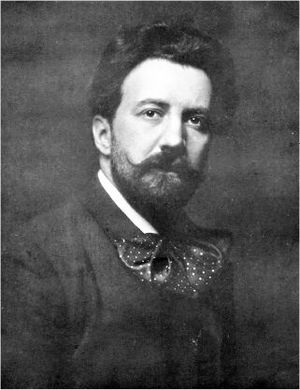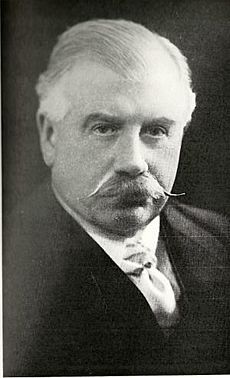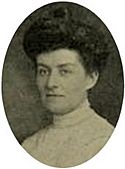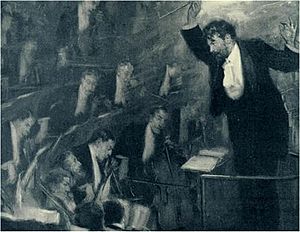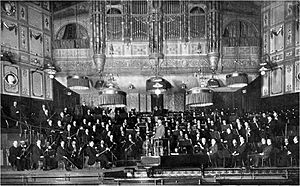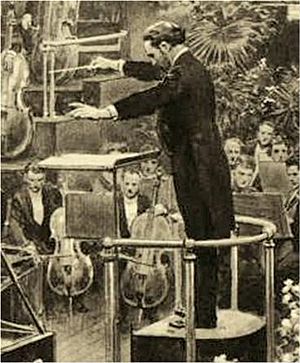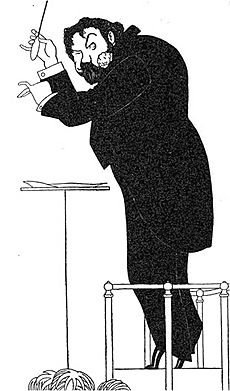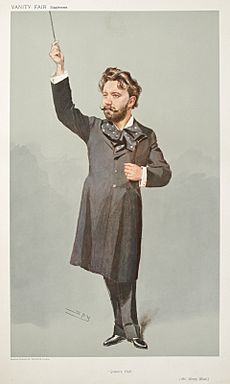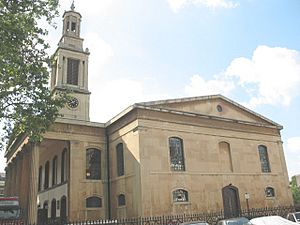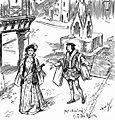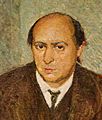Henry Wood facts for kids
Sir Henry Joseph Wood (born March 3, 1869 – died August 19, 1944) was a famous English conductor. He is best known for leading London's yearly series of concerts called the Proms. He conducted these concerts for almost 50 years, introducing many new musical pieces to British audiences. After he passed away, the concerts were officially named the "Henry Wood Promenade Concerts" in his honor. However, people still usually call them "the Proms."
Henry Wood grew up in a family that loved music. He started his career as an organ player. While studying at the Royal Academy of Music, he learned a lot from voice teacher Manuel Garcia. Wood later worked with opera companies, even conducting the first British performance of Tchaikovsky's opera Eugene Onegin in 1892.
From the mid-1890s until his death, Wood focused on conducting concerts. He was hired by Robert Newman to lead a series of promenade concerts at the Queen's Hall. These concerts offered a mix of classical and popular music at low prices. The concerts were very popular, and Wood conducted them every year until 1944. By the 1920s, Wood had changed the music to be entirely classical. When the Queen's Hall was destroyed in 1941 during World War II, the Proms moved to the Royal Albert Hall.
Wood believed it was his duty to serve music in the United Kingdom. He turned down offers to lead major orchestras in New York and Boston. Besides the Proms, he conducted concerts and festivals across the country. He also taught the student orchestra at the Royal Academy of Music. Henry Wood had a huge impact on British music. He and Newman made classical music more accessible to everyone. Wood also improved the quality of orchestral playing and helped the public discover a wide range of music.
Contents
Sir Henry Wood: A Music Legend
Early Life and Music
Henry Joseph Wood was born in Oxford Street, London. He was the only child of Henry Joseph Wood and Martha Morris. His father was a jeweler and engineer who also played the cello. His mother played the piano and sang. They both encouraged Henry's love for music. They bought him a piano, and his mother gave him lessons. Young Henry also learned to play the violin and viola.

Henry was inspired by the organist at his local church, George Cooper, who gave him his first organ lessons. When he was ten, Henry played the organ for money at St Mary Aldermanbury. In 1883, he played the organ at an exhibition and was hired to give more performances. At this time, painting was also a strong interest for him. He studied at the Slade School of Fine Art and remained an amateur painter throughout his life.
After taking private lessons from music expert Ebenezer Prout, Wood entered the Royal Academy of Music at age 17. He studied harmony, composition, organ, and piano. He became the accompanist for Manuel Garcia's singing class and was greatly influenced by him. Wood also accompanied the opera class. His goal at the time was to become a singing teacher, and he taught singing lessons for many years.
First Steps in Opera
After leaving the Royal Academy of Music in 1888, Wood taught singing and was very successful. He also worked as a répétiteur, which means he helped singers rehearse their parts. He worked for Richard D'Oyly Carte on operas like Ivanhoe and La Basoche. Wood loved the music of Arthur Sullivan and later made sure to include his concert works in his programs, even when they were not popular. During this time, Wood also had some of his own musical pieces performed.
Wood's first professional conducting job was in 1889. He became the musical director for a small touring opera group called the Arthur Rouseby English Touring Opera. The orchestra was very small, with only six players. Wood soon left this job and got a better one as a conductor for the Carl Rosa Opera Company in 1891. He conducted famous operas like Carmen and The Bohemian Girl.
In 1892, Wood conducted the first British performance of Tchaikovsky's opera Eugene Onegin in London. Critics praised his conducting. However, the opera was not popular with the public, and the season ended early. After this, Wood returned to teaching singing. From 1896 onwards, Wood's conducting career mainly focused on concert halls rather than opera.
Starting the Proms
In 1894, Wood met conductor Felix Mottl at a festival in Germany. Mottl hired Wood as his assistant for some concerts in London at the new Queen's Hall. The manager of the hall, Robert Newman, was planning a series of promenade concerts. Impressed by Wood, Newman invited him to conduct. Promenade concerts had been held in London since 1838. Newman wanted to make these concerts popular and introduce more classical music.
Newman wanted the Proms to be welcoming to everyone. He allowed smoking and refreshments during the concerts. Prices were much lower than other classical concerts. Standing tickets were one shilling, which was very affordable.
Newman needed money to start the first season. Dr. George Cathcart, a wealthy doctor, offered to help. He had two conditions: Wood must conduct every concert, and the orchestra's instruments must be tuned to the standard European pitch. English concert pitch was higher, and Cathcart believed it was bad for singers' voices. Wood agreed. Since the musicians didn't want to buy new instruments, Cathcart bought a set from Belgium and lent them to the players.
The first Queen's Hall Promenade Concert took place on August 10, 1895. Wood quickly started adding more classical music to the programs. He included symphonies by Schubert, Mendelssohn, and Schumann. He also introduced new pieces by composers like Richard Strauss and Tchaikovsky. Soon, every Monday night was dedicated to Wagner's music, and every Friday night to Beethoven's music. This tradition lasted for decades.
The concerts didn't have much time for rehearsals. Wood had only nine hours to rehearse all the music for six concerts each week. To get the best results, Wood marked all the orchestral parts with detailed instructions. He also developed a very clear conducting style. Musicians said that if you watched him, you couldn't make a mistake. Wood also insisted on accurate tuning. Before each rehearsal, he would check every woodwind and string instrument. He also changed the orchestra's seating arrangement, putting the first and second violins together on his left, which is common today.
In January 1897, Wood also took over the prestigious Saturday afternoon symphony concerts at the Queen's Hall. He often presented new works from many countries. He was especially known for his skill in Russian music. Sir Arthur Sullivan praised his performance of a Tchaikovsky symphony. Wood also showed that English conductors could lead Wagner's music well. In 1898, Queen Victoria asked him if he was "quite English" after he conducted Tchaikovsky and Wagner.
In 1898, Wood married Olga Michailoff, one of his singing students. She was also a talented singer.
Growing Fame and Challenges
The Proms continued to grow in popularity. In 1902, Robert Newman faced financial difficulties. The concerts were saved by Sir Edgar Speyer, a banker who provided the money. Speyer kept Newman as manager and encouraged him and Wood to keep improving the public's musical taste. Wood also became the conductor of the Sheffield triennial festival, changing its focus from choral to orchestral music. A German critic wrote that Wood and composer Edward Elgar represented a "new epoch in English musical life."
Later in 1902, Wood's health suffered from his huge workload. He took a break and went on a cruise to Morocco. The orchestra's leader conducted the Proms in his absence.
In the early 1900s, Wood introduced many European composers to his audiences. In 1903, he programmed symphonies by Bruckner, Sibelius, and Mahler. He also brought several of Richard Strauss's pieces to London. Strauss himself praised Wood's orchestra, saying he had created it "in such a short time."
Creating such a great orchestra was not easy. In 1904, Wood and Newman stopped the "deputy system." This system allowed orchestral players to send a substitute if they got a better-paying job. This meant Wood often faced new faces in his orchestra. After one rehearsal, Newman announced that there would be no more deputies. Forty players resigned and formed their own group, the London Symphony Orchestra. Wood held no grudge and later conducted their concerts.
Wood cared deeply about orchestral musicians. He worked to improve their pay and status. He was the first British conductor to make the orchestra stand and bow with him to acknowledge applause. In 1913, he started including women in the Queen's Hall Orchestra. By 1918, 14 women were playing in his orchestra.
Wood also conducted his own compositions. He wrote the famous Fantasia on British Sea Songs for a concert in 1905, celebrating the Battle of Trafalgar. This piece became very popular and is now a tradition at the "Last Night of the Proms," the lively final concert of each season.
Wood's first wife, Olga, passed away in December 1909. Wood was very sad, but he returned to his work. In June 1911, he married his secretary, Muriel Ellen Greatrex, and they had two daughters. In the same year, he received a knighthood, becoming "Sir Henry Wood." He also turned down the chance to lead the New York Philharmonic Orchestra, feeling it was his duty to stay in Britain.
Wood helped change how concertgoers behaved. Before him, audiences often clapped after each part of a symphony. Wood discouraged this, sometimes with gestures and sometimes by asking for it in the programs. He was praised for this change. His programs included many famous composers like Wagner, Beethoven, Tchaikovsky, and Mozart.
In 1912 and 1913, many famous composers like Strauss, Debussy, and Rachmaninoff conducted their own works or heard Wood conduct them at the Proms. Schoenberg's Five Pieces for Orchestra also had its first performance in Britain. Some audience members hissed the music, but Wood told his players, "Stick to it, gentlemen! This is nothing to what you'll have to play in 25 years' time."
Wartime Proms and Beyond
When the First World War began in 1914, Wood and Newman decided to continue the Proms. Anti-German feelings led to calls for banning German music. However, Newman stated that great music is for everyone, regardless of nationality. The Proms continued throughout the war, even with fewer new works. They helped boost people's spirits during difficult times.
Towards the end of the war, Wood was offered the job of musical director for the Boston Symphony Orchestra, one of the best orchestras in the world. He was tempted, but he felt it was his duty to stay in his home country.
After the war, the Proms continued. In 1921, Wood received the gold medal of the Royal Philharmonic Society, the first English conductor to get this honor. Wood also helped younger conductors. He encouraged Malcolm Sargent to focus on conducting. In 1923, Wood began conducting the student orchestra at the Royal Academy of Music, rehearsing with them twice a week for 20 years. He also conducted the amateur Hull Philharmonic Orchestra.
In 1925, Wood was invited to conduct four concerts for the Los Angeles Philharmonic Orchestra at the Hollywood Bowl. These concerts were very successful, and he was invited back in 1926 and 1934.
The Proms and the BBC
When Wood returned from Hollywood, he found a conflict between the Proms' sponsor, Chappell's, and the BBC. Chappell's chairman, William Boosey, was against broadcasting music, fearing it would harm live concerts. He tried to stop artists from performing at the Queen's Hall if they also broadcast for the BBC. This caused problems for the Proms.
When Robert Newman died in 1926, Chappell's announced they would no longer support the concerts. Many people were worried the Proms would end. However, the BBC announced it would take over the Proms. This was great news for Wood. The BBC gave him twice as much rehearsal time as before, which greatly improved the orchestra's performances. They also allowed him to use more musicians for larger pieces.
In 1929, Wood played a famous trick on music experts. He was tired of them criticizing his musical arrangements. So, he pretended his own arrangement of Bach's Toccata and Fugue in D minor was by a Russian composer named Paul Klenovsky. The press and BBC praised Klenovsky's "wonderful" scoring. Wood kept the secret for five years before revealing the truth. Everyone thought it was a great joke.
In his later years, Wood became very closely linked with the Proms. He was still a very important figure in British music, even as new, famous foreign conductors appeared.
Last Years and Legacy
In 1936, Wood conducted his final Sheffield festival. He led many great choral works, including Verdi's Requiem and Walton's Belshazzar's Feast. The following year, Wood planned a huge concert to celebrate his 50th year as a conductor. The Royal Albert Hall was chosen because it was much larger than the Queen's Hall. The concert took place on October 5, 1938. Rachmaninoff played his own Piano Concerto No. 2. Vaughan Williams composed a special choral work for the event called Serenade to Music. The concert raised £9,000 for musicians' health care. In the same year, Wood published his autobiography, My Life of Music.
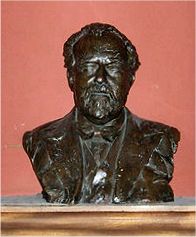
When the Second World War started in September 1939, the BBC moved its broadcasting out of London due to bombing risks. The BBC also stopped funding the Proms. However, Wood was determined to continue the 1940 season. The Royal Philharmonic Society and a private supporter helped. The season was cut short after four weeks when intense bombing forced the Queen's Hall to close. The hall was destroyed by bombs in May 1941.
It was decided that the 1941 Proms season would be held at the Albert Hall. Although it was twice as big and had poor acoustics, the six-week series was a success. The Albert Hall became the new home of the Proms. Wood, who was 72, agreed to have an associate conductor to help him. Basil Cameron joined him and continued as a Prom conductor for many years. The BBC brought its orchestra back to London and resumed supporting the Proms in 1942.
In early 1943, Wood's health worsened. He collapsed and was ordered to rest. Despite the war, the 1943 season sold nearly 250,000 tickets. Wood continued to conduct in other cities to help local orchestras. His final season was in 1944. He became ill in early August and could not conduct the 50th-anniversary Prom on August 10. He passed away just over a week later, on August 19, 1944. His ashes were buried in the Musicians' Chapel of St Sepulchre-without-Newgate.
Recordings
Wood started making recordings in 1908. He recorded with his first wife, Olga, for His Master's Voice (HMV). After Olga's death, Wood signed with Columbia. He made many recordings with singer Clara Butt, including parts of Elgar's The Dream of Gerontius.
Between 1915 and 1925, he conducted 65 recordings for Columbia using early recording methods. These included Wagner pieces and a shorter version of Elgar's Violin Concerto. When new electrical recording technology came out in 1925, Wood re-recorded the Elgar concerto and made 36 more discs for Columbia.
In 1935, Wood joined the new Decca company. For Decca, he conducted 23 recordings, including Beethoven's Fifth Symphony and Elgar's Enigma Variations. In 1938, he returned to Columbia. His new recordings included the Serenade to Music with the original 16 singers, and his own Fantasia on British Sea Songs.
Wood's recordings were not widely available after his death. However, some of his recordings have been reissued on compact disc.
Honours and Memorials
Besides his knighthood in 1911, Wood received other honors. He was made a Companion of Honour in 1944. He also received awards from Belgium and France. He earned honorary doctorates from five English universities. He was a fellow of both the Royal Academy of Music and the Royal College of Music.
Many musical pieces were dedicated to Wood. These included works by Elgar, Delius, and Vaughan Williams's Serenade to Music. The Poet Laureate, John Masefield, wrote a poem in his honor.
Wood is remembered in several ways. The Henry Wood Hall in London, a former church, is now a rehearsal and recording space named after him. A bust (a sculpture of his head and shoulders) of Wood stands in the Royal Albert Hall during every Prom season. On the Last Night of the Proms, it is decorated with a laurel wreath. His large collection of musical scores and parts is now in the library of the Royal Academy of Music. He also created the Henry Wood Fund to help music students financially.
His most famous memorial is the Proms themselves. They are officially called the "Henry Wood Promenade Concerts" but are known simply as "the Proms."
Images for kids
-
1891 production of Messager's La Basoche, for which Wood was répétiteur
See also
 In Spanish: Henry Wood para niños
In Spanish: Henry Wood para niños


